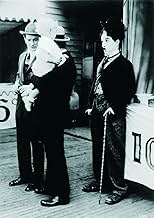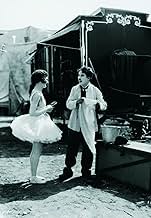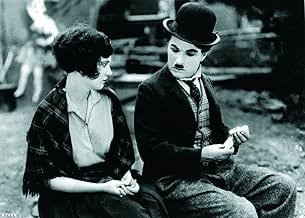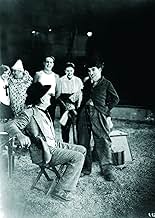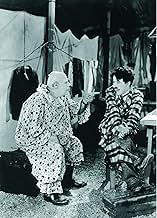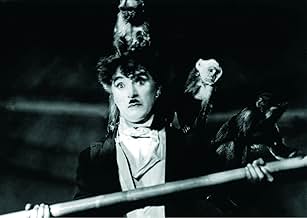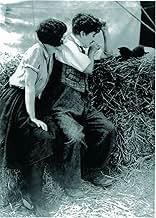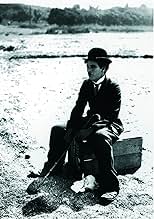CALIFICACIÓN DE IMDb
8.1/10
37 k
TU CALIFICACIÓN
Un vagabundo encuentra trabajo, y a la chica de sus sueños, en el Circo.Un vagabundo encuentra trabajo, y a la chica de sus sueños, en el Circo.Un vagabundo encuentra trabajo, y a la chica de sus sueños, en el Circo.
- Premios
- 3 premios ganados en total
Charles Chaplin
- A Tramp
- (as Charlie Chaplin)
Al Ernest Garcia
- The Circus Proprietor and Ring Master
- (as Allan Garcia)
Tiny Sandford
- The Head Property Man
- (as Stanley J. Sandford)
Albert Austin
- Clown
- (sin créditos)
Chester A. Bachman
- Cop
- (sin créditos)
Eugene Barry
- Cop
- (sin créditos)
Jack Bernard
- Man in Circus Audience
- (sin créditos)
Stanley Blystone
- Cop
- (sin créditos)
Heinie Conklin
- Clown
- (sin créditos)
Toraichi Kono
- Man in Circus Audience
- (sin confirmar)
- (sin créditos)
H.L. Kyle
- Man in Circus Audience
- (sin créditos)
Betty Morrissey
- The Vanishing Lady
- (sin créditos)
- Dirección
- Guionista
- Todo el elenco y el equipo
- Producción, taquilla y más en IMDbPro
Argumento
¿Sabías que…?
- TriviaIn the 1969 reissue, the 80-year-old Sir Charles Chaplin sang the title song.
- ErroresAfter the tramp washes the shaving cream from his face, he dries himself with a towel, but the towel never touches his face. (This is probably so that it won't mess up the stage makeup.)
- Citas
The Circus Proprietor and Ring Master: Go ahead and be funny.
- Versiones alternativasCharles Chaplin replaced the original credits of this film when he reissued it in 1969. In their place, there is an opening scene featuring Merna Kennedy on the trapeze while Chaplin sings a song, then the image fades to the credits of that version with no cast nor technical credits.
- ConexionesFeatured in The Circus: Premiere (1928)
Opinión destacada
The Little Tramp is chased into a circus tent during a performance; his antics prove funnier than those of the clowns, and the ringmaster hires him for the show.
When a comedian plays a character who is inadvertently hilarious, it can seem narcissistic: just check out Jerry Lewis's "The Errand Boy" where Lewis has his supporting cast praise the comic genius of the character played by Jerry Lewis. Despite this danger, and despite Chaplin's off-screen egotism, the premise plays beautifully, especially since The Little Tramp (though not Chaplin) is such a terrible comedian when he's trying to be one. My favorite moment is when the ringmaster demands the auditioning Tramp to be funny right that instant: the Tramp grins and shyly dances around a bit, gingerly falls down, puts his cane between his legs and meekly lifts himself back up. "Terrible!" roars his would-be employer.
This film has more self-awareness over comedy conventions that any other Chaplin I know of. The Tramp ineptly (but hilariously) performs a couple of standard comedy routines with the other circus clowns. Later, there's a funny twist to the old banana peel gag; and near the end he crashes into an old general store, looking as if he's thrust himself back into his old Keystone days. This is Chaplin's last true silent film, and the Keystone moment feels like a nostalgic farewell to the past.
"The Circus" is funny throughout, but the opening scenes are probably the best. There's a marvelous funhouse sequence and a priceless routine where The Tramp pretends to be a motorized dummy. (Has anyone seen the Swiss clock routine from "Your Show of Shows"?) He also falls in love with the ringmaster's cruelly treated daughter, which leads to a poignant ending.
I enjoyed the music, which Chaplin composed for this film in 1969. His scores are always repetitive; but they're also sweet and funny and they enhance the action. I could have done without the title-sequence song (which he sings himself)—something about looking up at rainbows. Otherwise, this comedy is near-perfect and holds its own against Chaplin's even greater features, "The Gold Rush," "City Lights" and "Modern Times."
When a comedian plays a character who is inadvertently hilarious, it can seem narcissistic: just check out Jerry Lewis's "The Errand Boy" where Lewis has his supporting cast praise the comic genius of the character played by Jerry Lewis. Despite this danger, and despite Chaplin's off-screen egotism, the premise plays beautifully, especially since The Little Tramp (though not Chaplin) is such a terrible comedian when he's trying to be one. My favorite moment is when the ringmaster demands the auditioning Tramp to be funny right that instant: the Tramp grins and shyly dances around a bit, gingerly falls down, puts his cane between his legs and meekly lifts himself back up. "Terrible!" roars his would-be employer.
This film has more self-awareness over comedy conventions that any other Chaplin I know of. The Tramp ineptly (but hilariously) performs a couple of standard comedy routines with the other circus clowns. Later, there's a funny twist to the old banana peel gag; and near the end he crashes into an old general store, looking as if he's thrust himself back into his old Keystone days. This is Chaplin's last true silent film, and the Keystone moment feels like a nostalgic farewell to the past.
"The Circus" is funny throughout, but the opening scenes are probably the best. There's a marvelous funhouse sequence and a priceless routine where The Tramp pretends to be a motorized dummy. (Has anyone seen the Swiss clock routine from "Your Show of Shows"?) He also falls in love with the ringmaster's cruelly treated daughter, which leads to a poignant ending.
I enjoyed the music, which Chaplin composed for this film in 1969. His scores are always repetitive; but they're also sweet and funny and they enhance the action. I could have done without the title-sequence song (which he sings himself)—something about looking up at rainbows. Otherwise, this comedy is near-perfect and holds its own against Chaplin's even greater features, "The Gold Rush," "City Lights" and "Modern Times."
- J. Spurlin
- 8 dic 2006
- Enlace permanente
Selecciones populares
Inicia sesión para calificar y agrega a la lista de videos para obtener recomendaciones personalizadas
Detalles
- Fecha de lanzamiento
- País de origen
- Sitios oficiales
- Idiomas
- También se conoce como
- The Circus
- Locaciones de filmación
- Glendale, California, Estados Unidos(ending exterior scenes - the circus wagons depart south on Verdugo Rd. from Glenoaks Blvd.)
- Productora
- Ver más créditos de la compañía en IMDbPro
Taquilla
- Presupuesto
- USD 900,000 (estimado)
- Total a nivel mundial
- USD 31,718
- Tiempo de ejecución1 hora 12 minutos
- Color
- Mezcla de sonido
- Relación de aspecto
- 1.33 : 1
Contribuir a esta página
Sugiere una edición o agrega el contenido que falta


